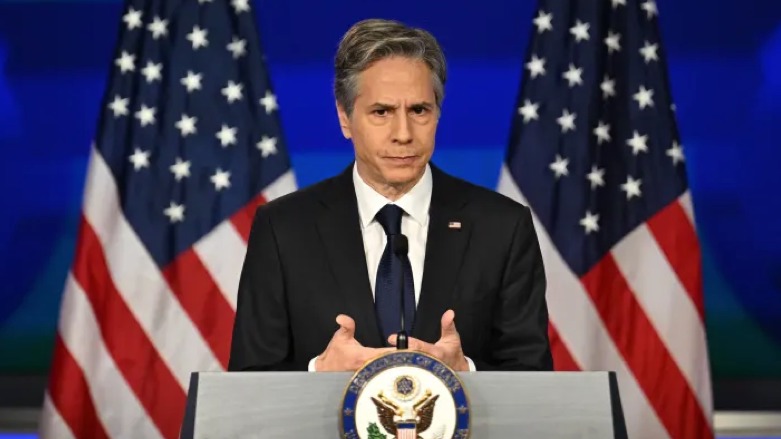US again endorses Saudi-Iran agreement that China mediated

WASHINGTON DC, United States (Kurdistan 24) – On Wednesday, U.S. Secretary of State Antony Blinken repeated a position first articulated last week by John Kirby, the National Security Council’s Coordinator for Strategic Affairs: the U.S. welcomes the agreement that China mediated between Iran and Saudi Arabia to normalize relations between the two countries.
The U.S. main concern is to maintain a cessation of hostilities in Yemen, but the agreement may also help limit conflict throughout the Middle East. That would include Iraq and the Kurdistan Region, which has also welcomed the accord.
Speaking to journalists while on a visit to Ethiopia, Blinken said, “From our perspective, anything that can help reduce tensions, avoid conflict, and curb in any way dangerous or destabilizing actions by Iran is a good thing.”
At the same time, Blinken expressed some skepticism as to whether Iran would really live up to its new obligations. “If this agreement actually bears out,” he said, “and particularly if Iran follows through on the commitments that it’s apparently made, again, that would be a good thing.”
The Saudi-Iran Agreement
The accord, which surprised most observers, was announced on Friday in a trilateral statement issued by China, Iran, and Saudi Arabia.
Read More: Iran, Saudi to restore ties in China-brokered deal
The statement explained that the new agreement was the product of talks held in Beijing from March 6 to 10. The three parties also thanked the governments of Iraq and Oman “for hosting rounds of dialogue” between Riyadh and Tehran in 2021 and 2022.
The agreement provides for the restoration of diplomatic relations between the two countries and the re-opening of “their embassies and missions within a period not exceeding two months.”
It also “includes their affirmation of the respect for the sovereignty of states and the non-interference in internal affairs of states.”
Saudi oil production is concentrated in its Eastern Province, which has a large Shi’a minority. Since Iran’s 1979 Islamic revolution, Tehran has regularly sought to stir up unrest among the Shiites living there.
In 2014, the Saudi Supreme Court affirmed a death sentence for a prominent Shia cleric, whom Riyadh had charged with terrorism: Shaykh Nimr Baqir al-Nimr. In January 2016, he was executed, sparking protests internationally, including in Baghdad.
Saudi Arabia had cut diplomatic ties with Iraq in 1990, following Saddam Hussein’s invasion of Kuwait. Relations between Riyadh and Baghdad were renewed only in 2015—after 25 years!
However, the Saudi embassy in Iraq was still closed at the time of Nimr’s execution, when it was targeted in a rocket attack. Because the embassy was unoccupied, the political fall-out was limited.
However, the situation was otherwise in Iran, where protestors assaulted the Saudi embassy and set it ablaze. Riyadh responded by cutting diplomatic ties, and they are now to be restored.
Impact of Saudi-Iranian Agreement
Assuming the agreement holds, it could have broad impact in the Middle East by reducing tensions between the two regional rivals. That would include Iraq, which welcomed the accord, and in Lebanon and Syria, as well.
The Kurdistan Region has also endorsed the agreement. “Naturally we would like to see an end to tension between regional states. Iran and Saudi Arabia are two important countries in the region,” Masoud Barzani, long-time President of the Kurdistan Region until his 2017 resignation and now head of the Kurdistan Democratic Party (KDP), told Al-Monitor.
“Maybe it’s too early to pass judgment,” he continued, “and to say much on it, but at least any efforts to reduce tension are welcome.”
But the biggest impact of the accord could well be in Yemen. In 2012, Yemen’s long-time ruler, Ali Abdullah Saleh, resigned in the context of the so-called Arab “spring.”
Two years later. a civil war broke out, essentially a proxy conflict between Iran and Saudi Arabia. Iran supported the Shiite Houthis who revolted against the internationally-recognized government and whom Saleh backed until his death in 2017. For its part, Riyadh backed the government.
Yemen’s nearly decade-long civil war has been a major humanitarian disaster. Somewhere between 150,000 and 200,000 people have died. According to New York’s highly-regarded Council of Foreign Relations, Yemen’s humanitarian crisis is “among the worst in the world, due to widespread hunger, disease, and attacks on civilians.”
In April 2022, the U.N. successfully mediated a cease-fire. It was renewed in August, and it was supposed to be renewed again in October, but that did not happen.
Nonetheless, the fighting has not resumed, and the U.S. hopes that the new agreement will help maintain the de facto calm.
“We welcome the agreement between Iran and Saudi Arabia, which we hope can lead to an end to the Yemen war and attacks on Saudi Arabian soil by Iran-backed rebels in Yemen,” Kirby told journalists on Tuesday.
Earlier Kirby had made clear that the U.S. was aware of the negotiations and there was a degree of coordination between Riyadh and Washington.
“The Saudis did keep us informed about the talks they were having,” Kirby said on Friday, “just as we keep them informed on our engagements, but we weren’t directly involved.”
